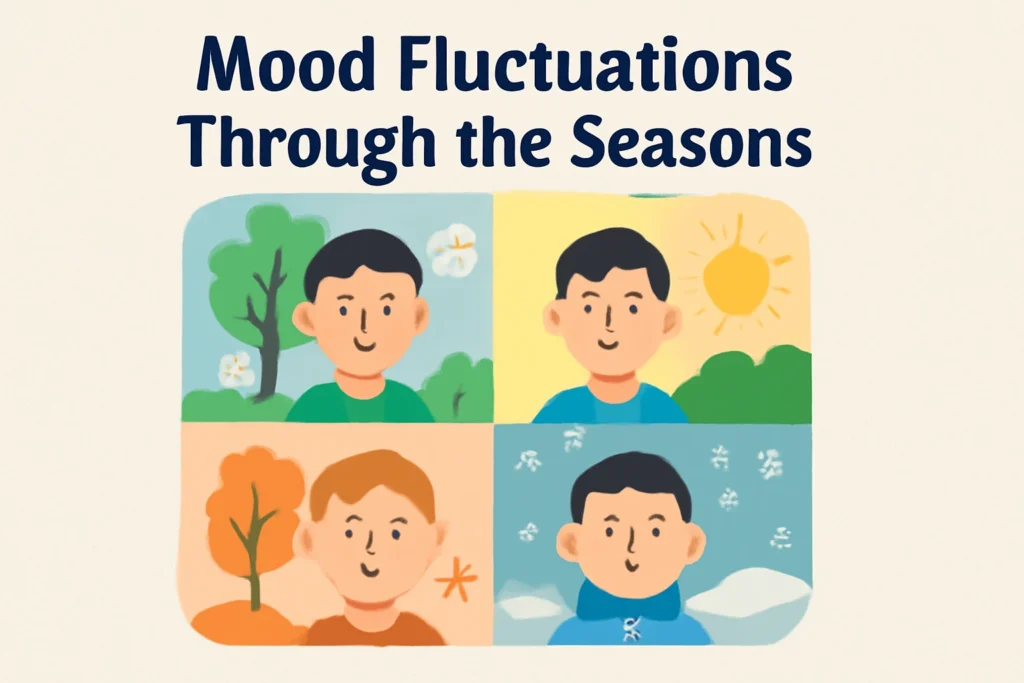Introduction
Changing seasons quietly shape our routines, moods, and even our physical and mental health, highlighting how seasons affect our overall well-being. Many people wonder how do changing seasons affect our lifestyle, as a sudden shift in temperature, daylight hours, and rhythm can spark subtle mood changes, influence sleep patterns, and impact daily habits. From the warmth of summer months boosting vitamin D production to the colder winter season bringing sluggish energy and seasonal affective disorder, our bodies and minds respond in unique ways. Recognizing the effects of seasonal changes helps us adapt our lifestyle with mindfulness, balanced routines, and healthier habits, ensuring we stay attuned to both the challenges and positive impacts each season brings.
Understanding Seasonal Change and Its Impact
What is Seasonal Change?
Seasonal change refers to the natural shifts in weather, temperature, and daylight that occur throughout the year, and how these factors affect the wellbeing of individuals. These seasonal cycles influence everything from our mood and energy levels to our physical and mental health. Understanding how changing seasons affect our lifestyle is important, as a seasonal shift can mean warmer months with longer days or colder months with reduced sunlight—each bringing unique effects on our well-being, with people responding to seasonal changes in different ways.
How Seasonal Changes Shape Daily Life
As the seasons change, people adjust their routines, diet, and activities to match the new rhythm. Changes in temperature and humidity can affect sleep patterns, immunity, and energy, making individuals more susceptible to illness during specific seasons. Recognizing these seasonal effects allows us to adapt proactively, improving our lifestyle year-round and enhancing our overall wellbeing, as psychological research shows the importance of seasonal awareness.
The Link Between Seasons and Mental Health
Seasonal Affective Disorder (SAD)
Seasonal affective disorder is a type of depression linked to seasonal change, often appearing during fall and winter months when daylight hours are shorter. Symptoms may include low mood, sluggish energy, changes in sleep patterns, and difficulty concentrating. Research has linked SAD to reduced sunlight exposure, which can disrupt the body’s rhythm and affect mental well-being.
How Sunlight Influences Mental Well-being
Sunlight plays a crucial role in regulating mood and producing vitamin D. Longer days in spring and summer can boost energy levels, while less sunlight in colder months may intensify negative effects on mental health. Mindful outdoor activity can help balance mood year-round.
Physical Health and Seasonal Patterns
Effects of Temperature and Humidity
Seasonal changes in temperature and humidity can significantly affect physical health, especially in the northern hemisphere. Extremely hot weather may lead to dehydration, heat stress, or heatstroke, while colder months often bring an increased risk of colds, flu, and joint stiffness, highlighting how the change of seasons can impact health. High humidity can worsen respiratory conditions and cause discomfort, while low humidity may dry out skin and mucous membranes, making the body more vulnerable to infections.
Immunity and Seasonal Illness Risk
The immune system’s performance can fluctuate with the seasons, making it crucial to understand how seasons affect our health. In winter, limited sun exposure can lower vitamin D levels, which are essential for immune function, increasing susceptibility to respiratory infections like colds and flu, and contributing to the symptoms of SAD that many people experience. Seasonal allergens such as pollen can also trigger asthma and hay fever in spring. Preventive measures like maintaining proper hydration, dressing appropriately for the weather, and getting recommended vaccinations can help reduce illness risk.
Mood Fluctuations Through the Seasons
Daylight Hours and Sleep Patterns
Changes in daylight throughout the year can significantly affect mood and sleep quality. Longer days in summer often boost energy levels and improve mood, while shorter winter days may lead to feelings of fatigue and low motivation, as individuals may experience irritability. This shift is linked to changes in circadian rhythm and melatonin production.

Coping with Sluggish Feelings in Winter
To combat the seasonal dip in mood, focus on lifestyle adjustments such as regular exercise, a balanced diet, and exposure to natural light whenever possible. Incorporating social activities and maintaining a consistent sleep schedule can also help improve energy and overall well-being during the colder months, particularly when psychological research indicates increased irritability.
The Role of Sunlight and Vitamin D
Benefits of Vitamin D Production
Sunlight exposure triggers the production of vitamin D in the skin, which plays a vital role in maintaining strong bones, supporting immune function, and boosting overall energy levels, especially as people respond to seasonal changes in sunlight availability. Adequate vitamin D is also linked to improved mood, as it helps regulate serotonin production, a key neurotransmitter that influences emotional well-being.
Vitamin D Deficiency in Cold Seasons
During the colder months, shorter days and weaker sunlight reduce the body’s ability to produce vitamin D naturally. This can lead to symptoms like fatigue, low mood, and weakened immunity. To prevent deficiency, it’s important to incorporate vitamin D-rich foods—such as fatty fish, eggs, and fortified dairy products—or consider supplements after consulting a healthcare provider.
Daily Routines and Behavioral Changes
Adjusting Diet and Exercise for Seasonal Shift
Adapt your fitness and nutrition to match the demands of each season. Lighter meals and outdoor workouts work well in warmer months, while heartier foods and indoor exercises help maintain energy in colder seasons, especially during summertime.
Mindfulness and Self-Care Through the Year
Practice mindfulness and self-care habits consistently, adjusting them to the time of year. Seasonal changes can affect mood and energy, so balance work, rest, and hobbies to stay both mentally and physically strong, as research shows the impact of these changes.
Positive and Negative Seasonal Effects
Positive Lifestyle Changes Across Seasons
Each season brings unique opportunities for personal growth and enjoyment, as many people experience different emotional responses to the changing of the seasons. Warmer months often inspire outdoor activities, better social interaction, and a noticeable boost in energy. Autumn’s mild temperatures encourage cozy routines, while winter offers time for rest and reflection.
Negative Effects to Watch Out For
Alongside the positives, seasonal changes can trigger challenges such as allergies in spring, heat-related illnesses in summer, and mood drops or vitamin D deficiency in winter, which psychological research has documented. Being aware of these effects makes it easier to take preventive steps, especially considering the prevalence of symptoms of SAD during the changing of the seasons.
Seasonal Effects on Lifestyle – Quick Comparison Table
| Season | Positive Impacts | Negative Impacts | Tips to Mitigate Issues |
|---|---|---|---|
| Spring | Outdoor activities, mood boost | Allergies (pollen), respiratory irritation | Use masks, stay hydrated |
| Summer | Higher vitamin D, more social interaction | Dehydration, heat-related illnesses | Drink water, avoid midday sun |
| Autumn | Cozy routines, mild temperatures | Reduced daylight, SAD onset | Light therapy, balanced diet |
| Winter | Rest and reflection, festive season | Low vitamin D, low energy, sluggish | Exercise indoors, vitamin D supplements |
Adapting to Seasonal Changes in Modern Lif
Just like adjusting your lifestyle to match the changing seasons, tech lovers also fine-tune their digital experiences for better performance. If you’re curious about optimizing your PC for peak visuals, check out this ray tracing guide for a detailed walkthrough. And for more lifestyle and tech insights, explore how seasonal changes can affect your overall wellbeing. Techy Infinity Where you’ll find guides, tips, and research-backed articles on how seasonal changes affect wellbeing and cognitive performance.
FAQs
How do changing seasons impact our mental health?
Seasonal changes can influence mood, energy levels, and emotional balance, which is why it’s important to recognize how many people experience these fluctuations. Shorter days and reduced sunlight in colder months may trigger feelings of sadness or fatigue, while warmer seasons often bring a boost in motivation and social activity, making us more susceptible to illness.
What are the symptoms of seasonal affective disorder (SAD)?
SAD symptoms may include persistent low mood, sluggishness, changes in appetite, difficulty concentrating, and disrupted sleep patterns, often appearing during fall and winter.
Why do I feel more tired in winter months?
Reduced daylight can disrupt circadian rhythm and lower serotonin production, leading to increased tiredness and decreased motivation during colder months, as research shows the psychological effects of seasonal changes.
Can seasonal changes affect physical health?
Yes, fluctuations in temperature and humidity can increase the risk of colds, flu, dehydration, and other seasonal illnesses, especially in the northern hemisphere.
How does sunlight influence mood and energy levels?
Sunlight boosts vitamin D production and helps regulate serotonin, which supports better mood, energy, and overall mental well-being.
What is the connection between daylight hours and sleep patterns?
Daylight impacts melatonin production, which controls the body’s sleep-wake cycle, leading to different sleep patterns across the seasons, and many people experience changes in their mood during the change of seasons.
How can I stay healthy during extreme weather changes?
Maintain a balanced diet, stay hydrated, dress appropriately for the weather, and engage in regular physical activity to protect your well-being year-round, especially as the change in weather can impact mood and energy levels.
Do seasonal changes affect everyone the same way?
No, individual factors like location, lifestyle, and overall health can influence how strongly seasonal shifts impact mood and physical health.
Conclusion
Recap Seasonal Effects on Mood, Health, and Routines
Each season brings unique changes that can influence your emotional well-being, physical health, and daily activities. Understanding how changing seasons affect our lifestyle helps you prepare and respond effectively.
Encourage Proactive and Mindful Adaptation Year-Round
By staying adaptable and mindful, you can make the most of each season’s opportunities while minimizing potential challenges. Small, intentional adjustments can help you maintain balance and well-being throughout the year, especially when understanding how do changing seasons affect our lifestyle.


